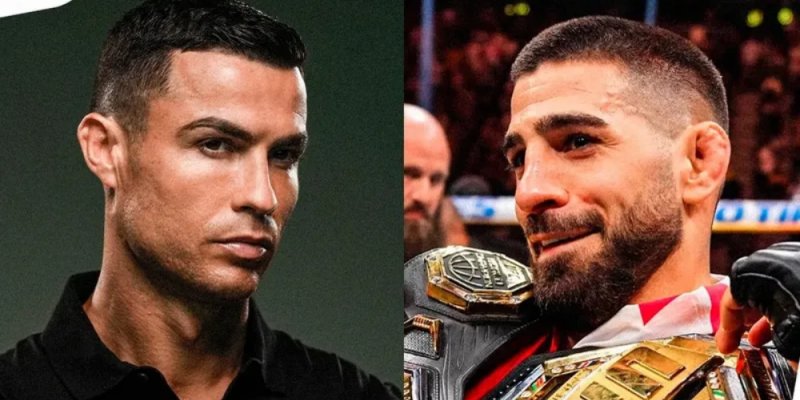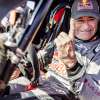
Islam Makhachev took the kind of risk many champions avoid for years: he moved up to a new weight class, stepped straight in against the reigning king of the division and calmly took his belt. At UFC 322 the Dagestani star made his welterweight debut against Jack Della Maddalena, dismantled the Australian's game in his biggest area of strength and became the first fighter from Russia in history to hold UFC titles in two divisions. And then, with two heavy belts on his shoulders, he suddenly asked for a fight... at the White House.
The Welterweight Challenge: Why Makhachev's Debut Turned Into a Mega Event
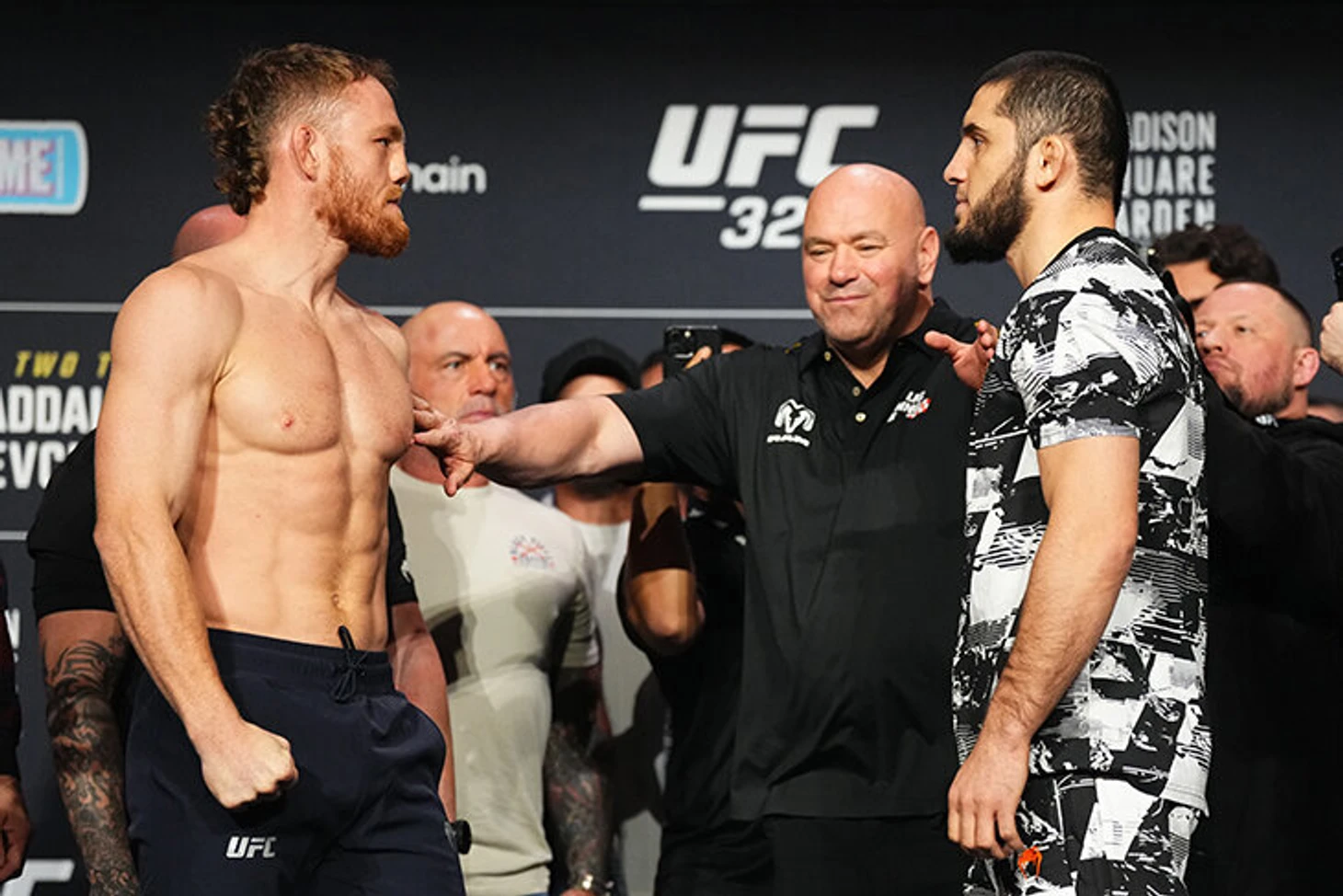
Fans had been waiting several years for Islam to move up to welterweight. The champion himself had repeatedly admitted that cutting down to lightweight drained him completely and that by fight night he managed to recover to at most 60 percent. In the end, ahead of UFC 322 Makhachev finally decided to bulk up and enter the new division – with no warm-up fights, straight into a bout with the champion.
The choice of opponent raised the stakes even higher. Della Maddalena was regarded as the best boxer in the welterweight division. In May 2025 he took the belt from Belal Muhammad by unanimous decision and came into the fight with Makhachev with a perfect UFC record of 8–0 (18–2 overall). On the way there the Australian had beaten Belal, Gilbert Burns and Kevin Holland, though he did not dominate every time: twice the judges went to a split decision, and Burns controlled him on the ground for more than five minutes.
Even after his protégé lost, Khabib Nurmagomedov kept stressing how dangerous Jack was: in his eyes Islam was not an obvious favorite, and according to Khabib, Maddalena was the toughest opponent of Makhachev's career.
The bookmakers still had Makhachev as a heavy favorite, with odds around 1.20–1.25, despite the fact that this was his debut in a new division and his opponent was the defending champion. Maddalena, long accustomed to being underestimated, calmly accepted the role of underdog and promised to drag Makhachev into the deep waters of the championship rounds and finish him closer to the end of the fight.
Champions' Camps and the Debate About a True Welterweight

Going into UFC 322 it felt as if two different champions' camps were preparing in parallel for the same fight. Maddalena went through one of the toughest camps of his career: he wrestled a lot, focused on defending takedowns and on his work in the clinch. He was helped by featherweight champion Alex Volkanovski and one of the best BJJ specialists in the world, Craig Jones. It was under Jones that the Australian significantly improved his grappling, and in 2023 the same coach prepared Volkanovski for his first fight with Makhachev. In that bout Alex became the first one in a long time who could consistently defend Islam's takedown attempts, with his Greco-Roman wrestling base playing a huge role.
For Islam, however, the main challenge lay not in his opponent but in his own body. He had to add muscle mass while keeping his explosiveness, cardio and speed on his entries to the legs. On the scale Makhachev looked very lean – he still had to shed around 10 kilograms before the fight – but inside the cage he no longer seemed small for welterweight. Maddalena had a seven-centimeter reach advantage, yet visually the difference in size was barely noticeable.
The weight discussion had started long before the fight. Sean O'Malley's coach Tim Welch argued that Makhachev was actually a natural welterweight and would look even better in the new division. UFC legend Georges St-Pierre, on the contrary, warned that moving up can make you feel like you're fighting with a backpack on your shoulders: the body gets heavier and your reactions slow down. Still, GSP himself moved up to middleweight in 2017 after a four-year layoff and nevertheless took the title.
On Maddalena's side were his boxing and distance management. At the face-off and on the scales he deliberately clenched his fists and extended his lead hand towards Islam as if he were already measuring his working jab range. Controlling the punching distance was considered one of the keys to his success – many called Jack the best pure boxer in the UFC.
Makhachev, though, insisted that he was not going to chase wrestling blindly. He emphasized that he could fight comfortably on the feet as well, reminded everyone that he had already shown more than once that he could trade with anyone, and pointed out that in grappling he was far ahead of most opponents. In Islam's words, if for some reason his wrestling did not work, he was always ready to turn the bout into a spectacular striking battle – and his goal was to prove that he is the best fighter in the world with a complete skill set.
Relentless Pressure: A Round-By-Round Breakdown of Makhachev vs Della Maddalena
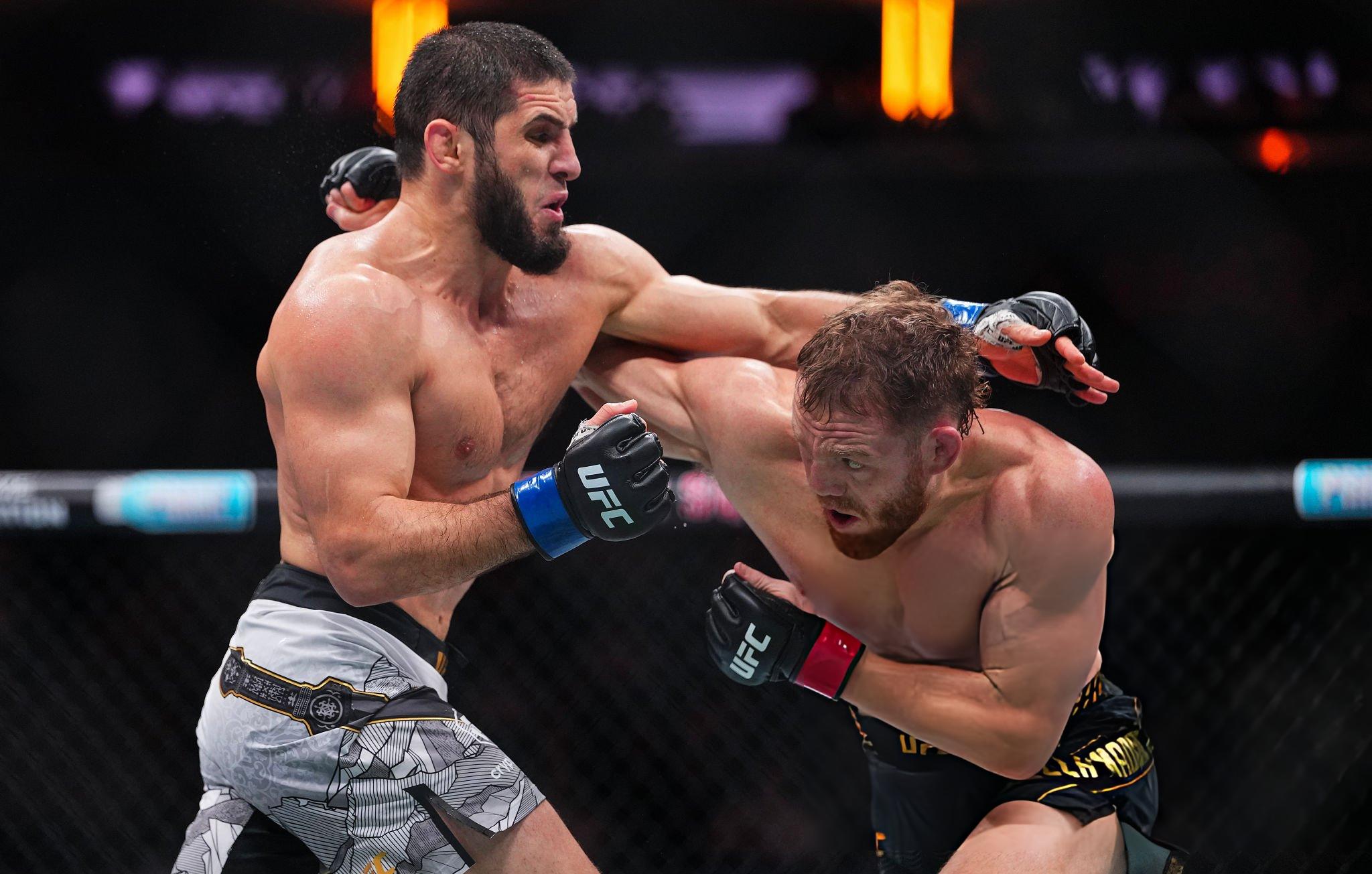
Maddalena started the fight aggressively, just as he had promised. He immediately took the center of the octagon, threw combinations and tried to shake Makhachev's guard. But already in the second minute Islam took away his main weapon – confidence on the feet. He timed a clean single-leg, knocked out the base and took the Australian to the ground, where he methodically controlled him from top position until the end of the round. Jack spent energy trying to get up but could not escape, even though he avoided serious damage.
Within the very first five minutes the key difference between Makhachev and Belal Muhammad became obvious: Islam did not delay his takedowns, he brought his wrestling into play immediately and held his opponent much tighter. After the opening horn Maddalena looked confused – he had wanted to dictate the fight as the aggressor, but instead found himself pinned to the canvas.
In the second round Jack tried to return to his original plan: again he moved forward and pushed Islam towards the fence. But soon he almost walked straight into a powerful high kick – the kind that once sent Volkanovski into a knockout. After that striking exchange the fight shifted into a clinch against the fence, where many expected another takedown from Makhachev. Instead, Maddalena surprisingly went for a throw of his own and paid for it: Islam ended up on top again and dominated on the ground for more than three minutes, chipping away at his opponent and stealing his time and energy.
The third round confirmed just how huge the gap in grappling levels was. Maddalena kept trying to move forward, but whenever Islam slightly picked up the pace, Jack once again found himself on the mat. All his attempts to defend the takedowns failed: Makhachev was taking him down almost on a schedule, working calmly and without rushing, constantly switching positions and giving Maddalena virtually no chance to launch any offense of his own.
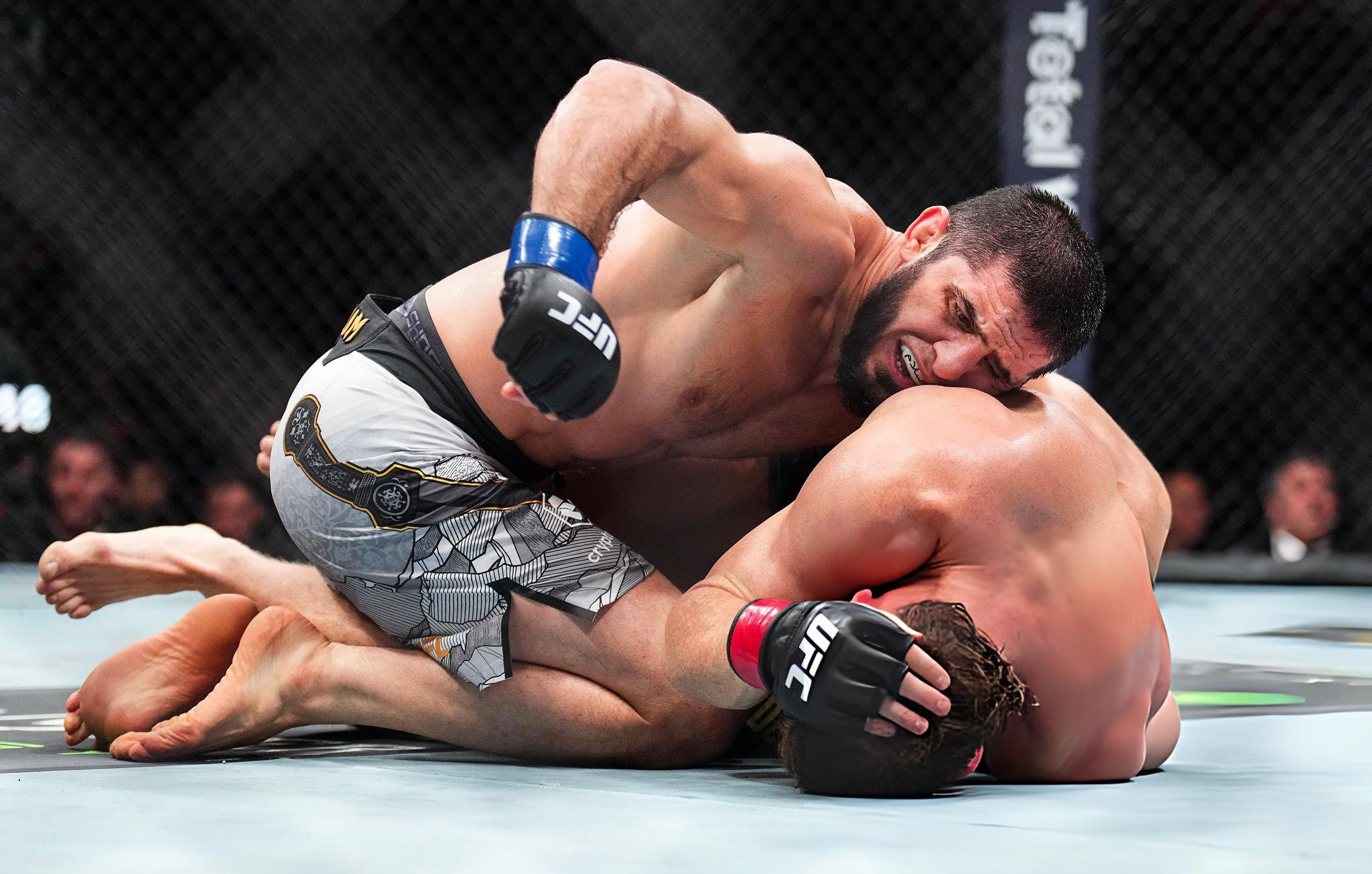
By the fourth round calf kicks made the picture even worse for the Australian. Islam was targeting his opponent's lower leg, forcing him to switch stances and disrupting his balance. Maddalena's movement slowed down and his punches lost their sharpness. Each time he tried to seize the initiative, Makhachev dove in on a double-leg and dragged the fight back to the ground – almost automatically, as if by timer.
Even so, it was impossible to completely write Maddalena off before the fifth round. Earlier against Gilbert Burns he had lost the first two rounds but still managed to knock his opponent out in the final stretch, despite entering the fight after a staph infection and breaking his hand in the opening frame. Jack clearly had championship-level heart, and Makhachev's team understood that perfectly well.
In the final five minutes the Australian went all in, roaming the cage in search of a miracle knockout. But the more he took risks, the more openings he left for yet another takedown: just 20 seconds in he was flat on his back again, and Islam, in top position, calmly controlled him until the final horn, making several attempts to lock in an arm or a choke to finish by submission.
The judges' scorecards left no room for doubt: a unanimous decision for Makhachev, with not a single round given to Jack. The fight may not have ended in a highlight-reel knockout, but in terms of dominance it was a true masterclass. Islam completely shut down the division's most dangerous boxer and showcased a striking gap in wrestling ability.
Two Belts, 19 Minutes of Control and a Call-Out to the President
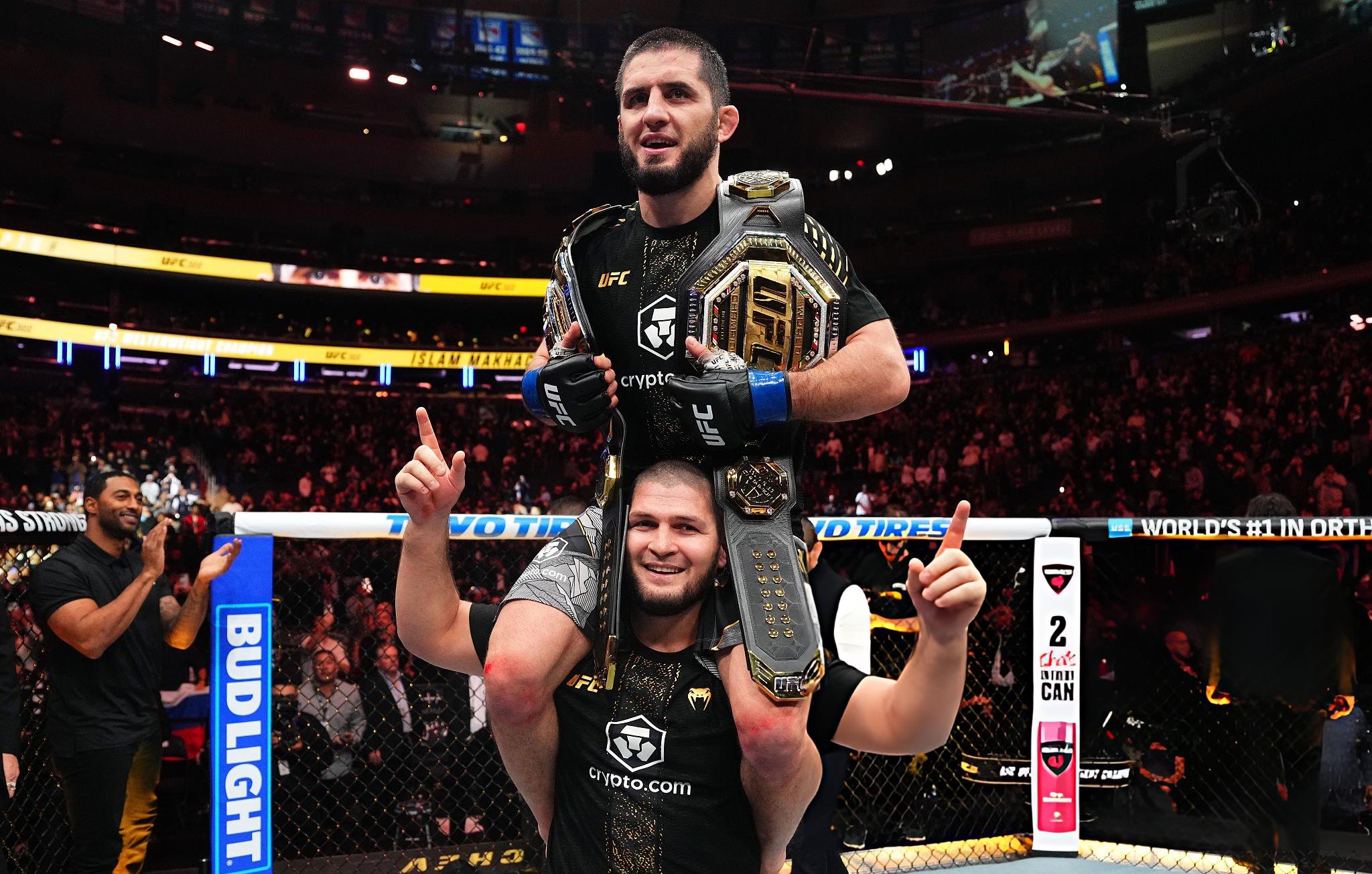
After the final horn the most emotional part of the evening began. Makhachev slung both belts over his shoulders – even though he no longer officially holds the lightweight throne, symbolically he remained a two-division champion. Then, as tradition dictates, Islam took a lap on Khabib's shoulders, posed with the whole team and Hasbulla, while the stats recorded almost 20 minutes of pure ground control over the reigning welterweight champion.
In his post-fight interview Islam openly explained how the change of weight class had affected him. He admitted that being free from a brutal weight cut allowed him to work for five rounds non-stop, to keep wrestling without breaks and to make this fight as comfortable for himself as possible. According to Makhachev, the whole world knows his game plan, but no one has yet been able to stop it.
Then came the line that instantly went viral on social media: Makhachev addressed Donald Trump, calling on him to open the doors of the White House and hinting at his desire to perform at an event under his banner.
In this way Islam not only made history as the first two-division champion from Russia but also turned his success into a global statement. The UFC now has a new dominant star in two weight classes at once, and the welterweight division has a champion who, even in his debut at the weight, showed that his pressure, wrestling and discipline are enough to break even the most dangerous knockout artist. And it seems clear that this victory is far from the limit of Makhachev's ambitions.

